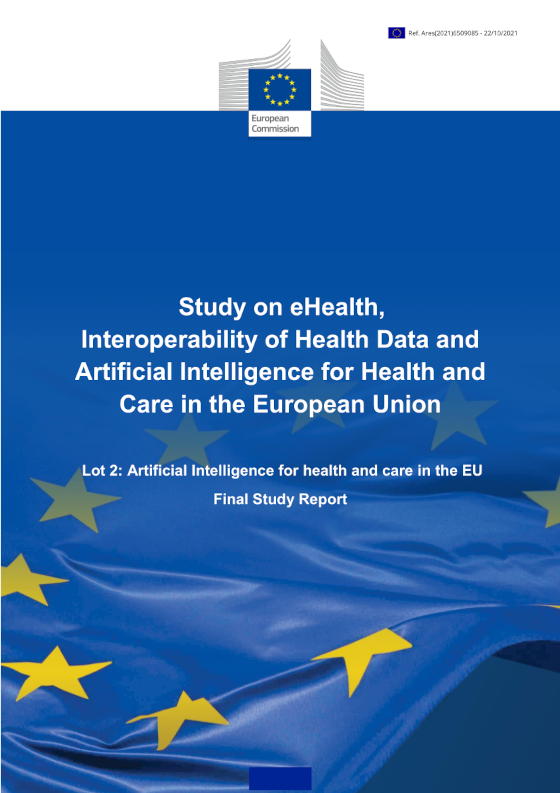 This study presents an overview of the development, adoption and use of Artificial Intelligence (AI) technologies and applications in the healthcare sector across all Member States. The main aim of this study was to support the European Commission in identifying and addressing any issues that might be hindering the wider adoption of AI technologies in the healthcare sector. The study will help the Commission to take action to achieve its long-term goal on the effective implementation of AI in the healthcare sector, based around common legislation and policy framework.
This study presents an overview of the development, adoption and use of Artificial Intelligence (AI) technologies and applications in the healthcare sector across all Member States. The main aim of this study was to support the European Commission in identifying and addressing any issues that might be hindering the wider adoption of AI technologies in the healthcare sector. The study will help the Commission to take action to achieve its long-term goal on the effective implementation of AI in the healthcare sector, based around common legislation and policy framework.
According to the study, while most EU Member States have developed AI strategies that identify healthcare as a priority sector, there are no policies within those strategies targeting healthcare in particular. However, EU Member States have made progress in proposing regulatory frameworks around the management of health data, which is a foundational element for the further development of AI technologies in the healthcare sector.
In terms of adoption, while healthcare organisations in the EU are open to adopting AI applications, adoption is still currently limited to specific departments, teams and application areas. The lack of trust in AI-driven decision support is hindering the wider adoption, while issues around the integration of new technologies into current practices are also among the main challenges identified by relevant stakeholders in EU Member States.
The scientific output in the area of AI in healthcare comes mainly from the larger Member States. They are the most active countries at collaborating between themselves and with smaller Member States. Additionally, a need for further financial support has been identified to enhance the development of AI technologies, which are translated into clinical practice. It includes support for targeting the acquisition of Intellectual Property (IP) rights for the already developed technologies.
The study has highlighted 6 categories where the European Commission is suggested to focus to support the development and adoption of AI technologies in the healthcare sector across the EU. These include:
- a policy and legal framework supporting the further development and adoption of AI aimed at the healthcare sector in particular;
- initiatives supporting further investment in the area;
- actions and initiatives that will enable the access, use and exchange of healthcare data with a view to using AI;
- initiatives to upskill healthcare professionals and to educate AI developers on current clinical practices and needs;
- actions addressing culture issues and building trust in the use of AI in the healthcare sector;
- policies supporting the translation of research into clinical practice.
Country Factsheets
The country factsheets present an overview of the current situation in each EU Member State with regards to the development, adoption and use of Artificial Intelligence (AI) technologies and applications in the healthcare sector. The factsheets aim to support the European Commission in identifying the current state of development and adoption of AI in the healthcare sector in each Member State and identify any differences that might bring to light specific challenges and obstacles to the wider adoption across the EU.The country factsheets are based on an analysis of the relevant legislation and policy framework around AI in each Member State. They look at the research and innovation landscape of each country in the area of AI in healthcare, the presence of cross-border collaborations in research, the start-up ecosystem in each country, and the awareness around AI technologies in the healthcare sector based on social media mentions.
While most EU Member States are taking measures towards establishing strategies around the use of AI in healthcare, most initiatives focus on the research and innovation area. There is little activity on initiatives to promote adoption by the sector itself. The start-up ecosystem varies across EU Member States and is mostly driven by private initiatives and support networks.
Finally, awareness around EU Member States on AI in healthcare as seen on social media and news sites are largely event-related, with spikes in awareness coinciding with published articles or national-level initiatives appearing in the local press.
Download: Artificial intelligence in healthcare - Final Report (3.095 KB).
Download: Artificial intelligence in healthcare - Final Country Factsheets (8.117 KB).
Download from DIGITAL HEALTH NEWS: Artificial intelligence in healthcare - Final Report (3.095 KB).
Download from DIGITAL HEALTH NEWS: Artificial intelligence in healthcare - Final Country Factsheets (8.117 KB).